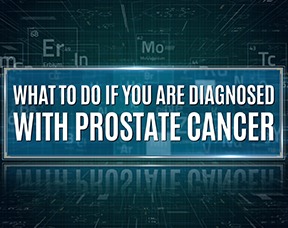Hearing from your doctor that you have prostate cancer can be both frightening and emotionally overwhelming. There will also be a number of questions running through your head about your diagnosis and what your next step should be. About (99%) of men diagnosed with prostate cancer will have an estimated 5-year survival expectancy after diagnosis and nearly (98%) of men will have a 10-year survival expectancy. Here are some things you can do after being newly diagnosed.
Learn more about your diagnosis:
The first step is to fully understand the extent your diagnosis. Your doctor will establish this by determining the grade and stage of your prostate cancer.
Stage:
The stage characterizes how far the cancer has spread within the prostate and whether or not it has spread into other parts of your body. Many diagnosed cases of prostate cancer in the United States generally fall into either the T1 – T2 stages, which is cancer that is still confined to the prostate.
Grade:
The “Gleason Scale” is used in determining the overall aggressiveness of your cancer and applying a grade to it. The score(s) are individual numbers used to identify the two most common patterns within the cancer.
Discuss your treatment options:
There are many treatment options available for men who have been diagnosed with prostate cancer. Based on both the stage and grade of your prostate cancer a comprehensive assessment must be made on all of the treatment options which are available to you in addition to their results. This will require a consultation with a prostate cancer specialist to help paint a clearer picture of your condition and what your best course of action for treatment should consist of.
The most commonly used treatment options used are:
- Radiation therapy
- Hormone therapy
- Chemotherapy
- Radical prostatectomy (surgical removal of the prostate)
- Cryotherapy (freezing of the prostate)
- Active surveillance
Make lifestyle changes:
A healthy lifestyle plays an important part when it comes to fighting prostate cancer and maintaining prostate health. Recent studies have suggested that making lifestyle changes go a long way toward preventing or slowing the progression of prostate cancer. Some of these changes include engaging in increased physical activity, changing your diet, controlling your stress, and reducing your use of tobacco and alcohol.
Being diagnosed with prostate cancer isn’t a death sentence and the cancer is not only manageable, but is also very treatable.


